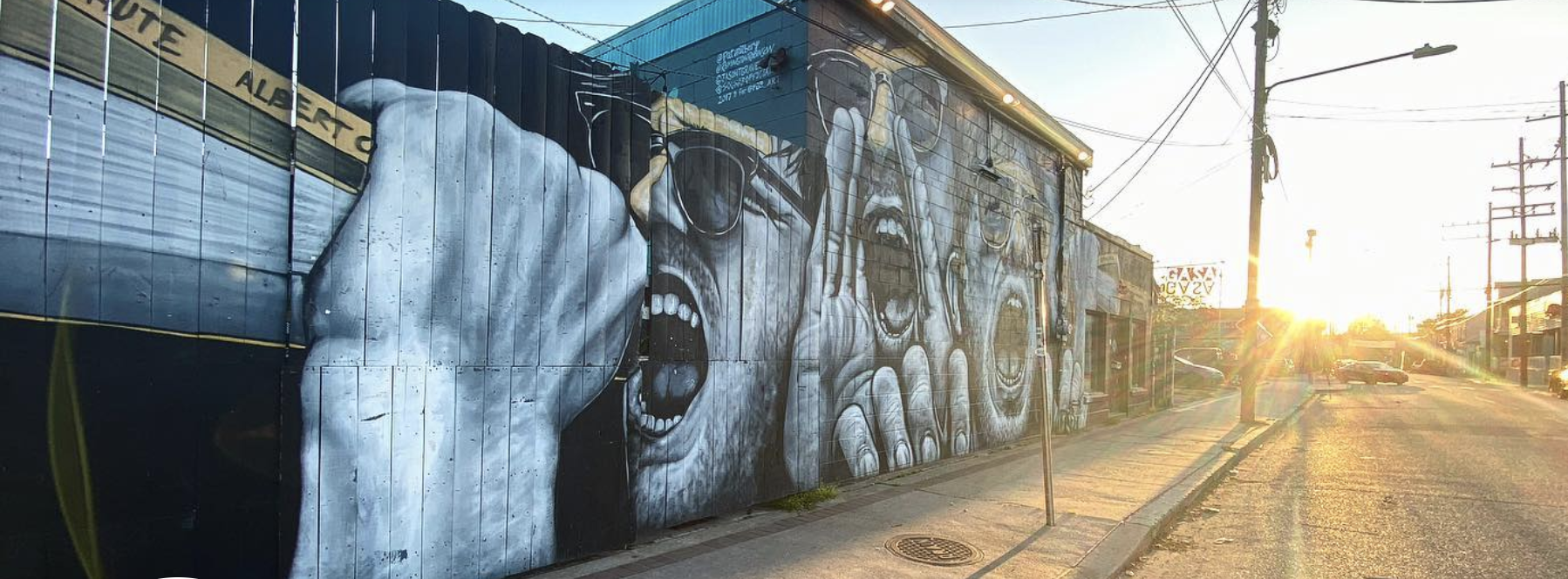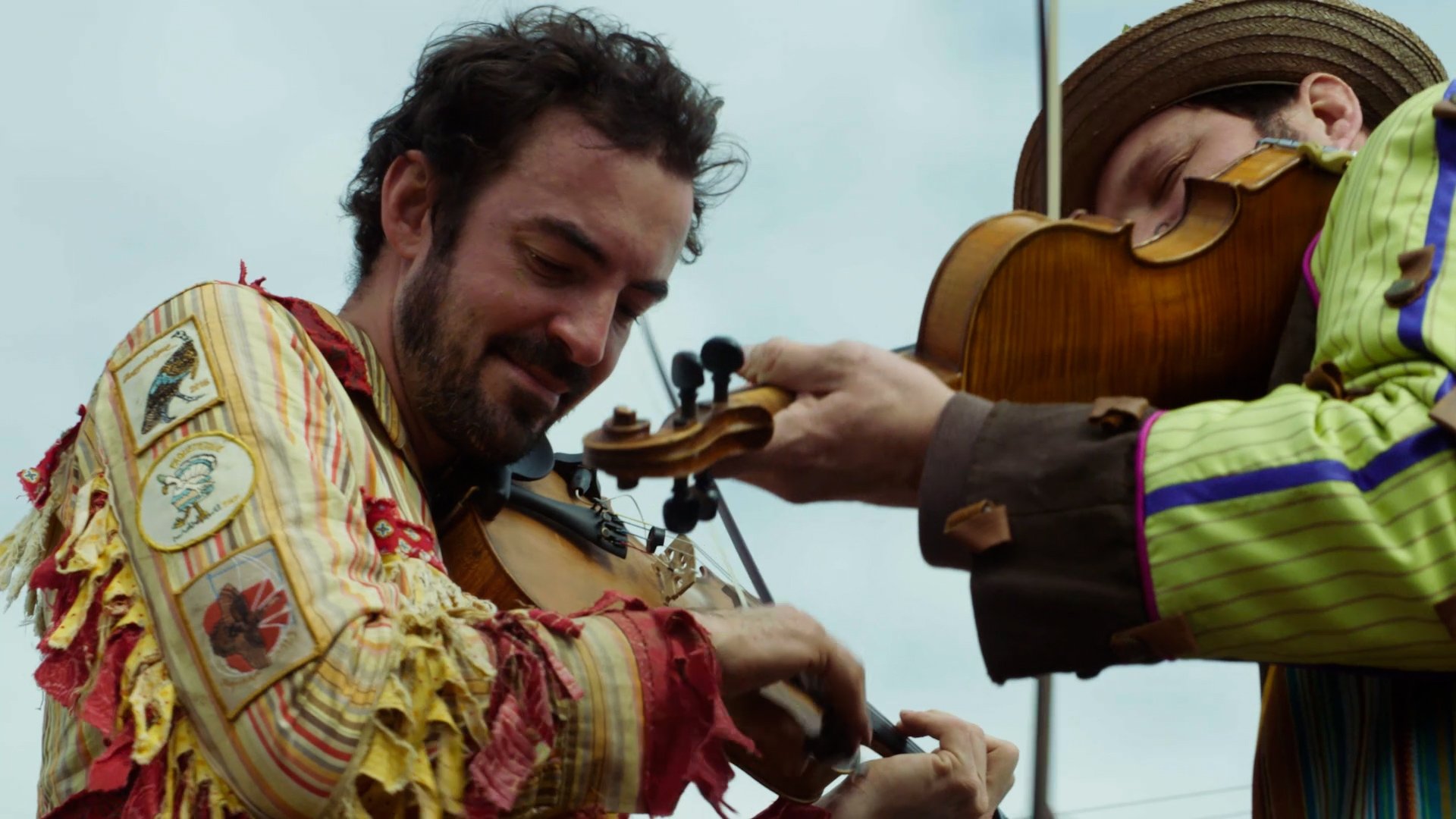Mipso Gets to the Point

The "contemporary folk" quartet looks to its roots and finds new ones on "Coming Down the Mountain."
Despite its mysterious name, Mipso is a remarkably plainspoken outfit. On its third album, Coming Down the Mountain, released in April, the band deals with heartbreak, homesickness, and wanderlust. The songs treat these well-trodden subjects with care, but they don’t mince words. They are clean and straightforward, rooted firmly in the folk tradition, but never overly folksy. This Saturday, Mipso will play Gasa Gasa with support from New Orleans singer/songwriter Patrick Cooper.
“We love people who can say a lot by saying a little,” says Liddy Rodenbough, whose quietly powerful vocals and unassuming fiddle playing helps define Mipso’s sound. “One of the things we brought with us from the bluegrass world, and the broader southern string band world, was songs that are, on the surface, very simplistic, but have a subtler, deeper meaning about the culture they come from.”
Like the rest of Mipso, Rodenbough is from North Carolina, but she never played southern roots music until, as a college freshman, she left UNC-Chapel Hill for a year to take classes at the Old Town School of Folk Music in Chicago. There, she learned how to improvise and developed a love for old time string band music that she would later incorporate into Mipso’s bluegrass aesthetic.
“Being in Chicago was the first time I was away from the South for any extended period of time, and that made me reflect on where I was from more than I ever had when I was just there,” she recalls. “There are a lot of people who play old time at that folk school, and they expected that I would know how, as if it would be like part of drinking the water or something. It made me kind of self-conscious about knowing so little about my own tradition.
Rodenbough grew up in Greensboro, slightly more than 50 miles west of the “triangle” (Raleigh, Durham, Chapel Hill) where Mipso would rise to prominence in the flourishing folk scene.
“It’s a fairly big city, but it doesn’t have a lot of personality. It’s kind of like growing up in the suburbs anywhere,” she says. “So even though I’ve never lived anywhere but North Carolina, I didn’t really feel much like a southerner, or like I had a lot of southern cultural heritage. Starting to play this type of music led me in the direction of my own roots.”
A return to the roots resonates throughout Coming Down the Mountain, even in its most modern moments. Rodenbough wrote the album’s title track as an allegory for trying to check back into reality after a long period of disengagement from the things that matter. Even this full-song metaphor, which literalizes the head-in-the-clouds mentality as a long fishing trip, is delivered with such easy clarity and precision that it never becomes trite or opaque.
“Throughout college, I was so disenchanted with the given options for being a part of political life in our country that I wanted to stick my nose in the air and tune out and read a bunch of Socialist writing,” Rodenbough says. “And I was surrounded by people who felt the same way.”
Her disillusioned attitude (not uncommon among college students) began to change when she graduated and hit the road with Mipso. On tour, she noticed the disparity between the aloof headspace she and her friends inhabited and the reality of life outside her college campus.
“Especially playing bluegrassy music, I was coming into contact with people who I knew shared very little with me politically. And it’s not a good feeling to feel that way about your fellow citizens, especially people who are your fans,” she says. “So the song was written in the middle of my personal process of reckoning with the foolishness of my college arrogance, which is not a process that I’m finished with."
Rodenbough may still be exorcising the demons of her college pretentiousness, but they are nowhere to be found on Coming Down the Mountain. Even the instrumentation—plugged in for the first time in the band’s career and augmented with drums and even the occasional organ—seems to exist as an organic outgrowth of the lyrics and melody.
“I think that our mentality toward songwriting is parallel to our mentality toward production,” Rodenbough says. “We don’t want to impose a structure or instrumentation on a song. We want the instrumentation to be the song’s support system. I think that’s a whole position toward music, in a more general sense, that we have, and we were especially into that for this record.”
Coming Down the Mountain is the first of Mipso’s records produced by Brad Cook of the Durham-based psychedelic folk group Megafaun. Rodenbough claims that, despite Cook’s experimental background, he played a large part in creating the aura of frankness that permeates the record.
“He’s the king of chill,” she says. “He’s just this very vibey dude, and I think that at the core of his relationship to music is an emphasis on not overthinking. So we had that contagious vibe from him, but part of it was just that we were really rearing to go. We had a bunch of material and we felt good about it. We didn’t want to hesitate and spend time complicating the matter.”
The songs on Coming Down the Mountain are mostly personal projects written by individual members of Mipso during a 2016 spent almost entirely on the road. The band played almost 150 shows last year, according to Rodenbough’s rough estimate, so it wasn’t until wintertime that they were finally able to sit down together and share what they’d each been working on.
“We had a show in Wisconsin, and we had some friends who had a cabin up there at Little Sister Bay,” Rodenbough remembers. “We decided to take the opportunity, while we were up in this exotic frozen tundra, to hole up in the cabin and feel really cozy and work on some songs together.”
A few months later, the band members regrouped for another session, this time at a barn back in North Carolina, owned by different friends. “We rely so much on other people’s hospitality, even when we’re not touring,” Rodenbough happily admits.
This time, with a fuller idea of what they wanted the songs to sound like, they began to experiment with the electric instrumentation that would eventually be featured on the album. The transition, though, was more of a natural progression than a spontaneous decision.
“The songs naturally felt like they could use a bigger rhythmic element than we’d had in the past,” Rodenbough says “In the bluegrass world, there’s this symbolism that a drum kit signifies something dramatic, but it’s funny—when we were listening back to our old albums, there was so much auxiliary percussion on a lot of tracks that it was almost like we were quietly replicating the sound of a drum kit. So aurally, it wasn’t that much of a departure.”
Mainly, the shift was inspired by the band’s shared love for music made in the ‘60s and ‘70s in the Laurel Canyon neighborhood of L.A., where artists like The Byrds and Crosby, Stills & Nash (& Young) put out their best work. Coming Down the Mountain emulates the Laurel Canyon vibe by adding steel pedal guitar, reverb, and a rhythm section to Mipso’s formerly acoustic arsenal. It all meshes together with the band's core string band sound to create a record that is deeply nuanced despite its apparent simplicity.
“I don’t know that our album bears a lot of resemblance to Joni Mitchell, but we really admire the ways some of those mid-career Joni Mitchell albums were made—that super lush, intentional L.A. sound, very produced but always in the service of musicality,” Rodenbough says. “And our mentality has always been the same. We want to honor the songs.”






